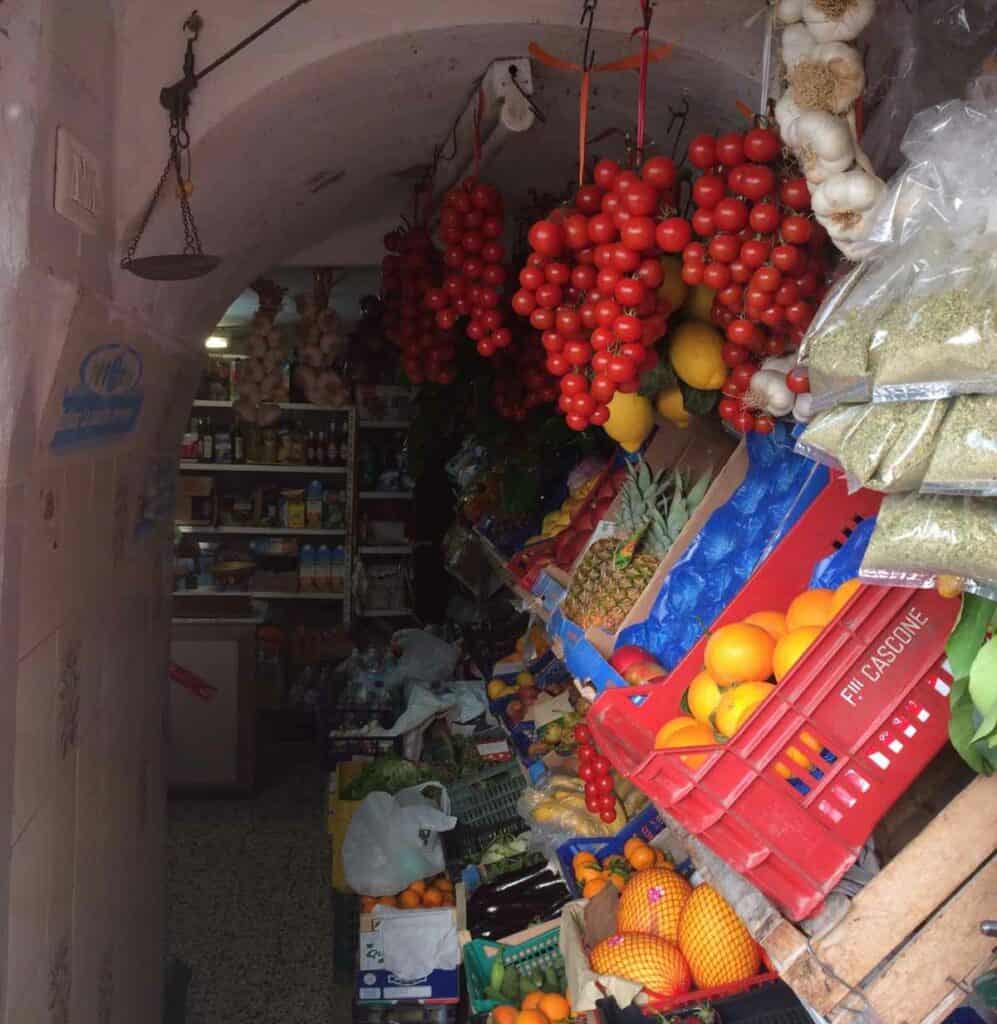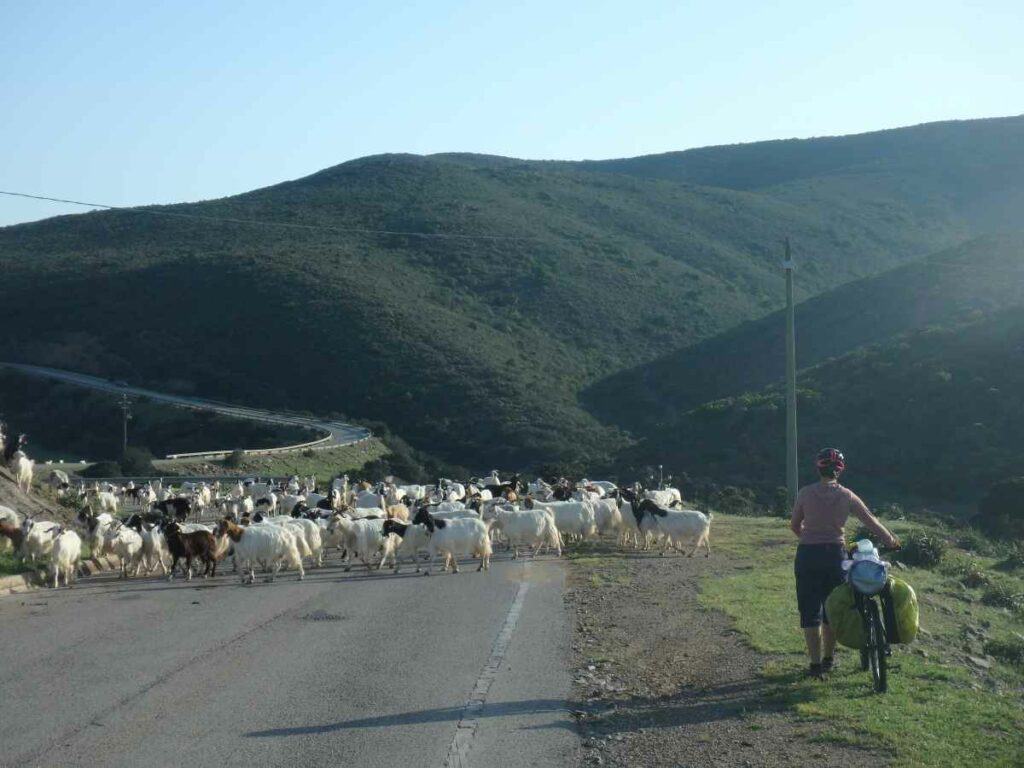Sardinian’s robust health is not only the result of the Mediterranean diet they eat—cereals, vegetables, fruits, legumes, nuts, olive oil, wine and coffee—but how they eat.
Sardinia: A Mediterranean Blue Zone
Sardinia is an island 300 km off the west coast of Italy. It has been categorised as a Blue Zone, a region of the world where people regularly live longer than elsewhere.
There is much speculation about why people in these regions live to a ripe old age. Diet is likely to be an important factor.
Sardinia’s Mediterranean Diet
The Sardinian diet consists of whole-grain bread, beans, vegetables, fruits and cheese, with meat mostly consumed on Sundays and special occasions.
Yet it may be more than the foods eaten that contribute to the robust health of the Sardinian people. It may also be that the foods eaten in Sardinia are predominately locally produced and minimally processed.
Travelling through Sardinia, my husband and I have witnessed people in the hill country herding goats, the milk predominately used for making a variety of cheeses. We saw small farms growing grains, olives and citrus fruits. On one leg of our cycle journey, we even saw trucks transporting milk and grain to factories for bottling milk and manufacturing pasta.
Small delicatessens sold freshly made bread, local cheeses and cured meats in the villages we visited.

Sardinia’s Blue Zone Lifestyle
Not only is it the food they consume, but it is also likely that the subsistence-based lifestyle, which is physically demanding and requires considerable time outdoors, is a major factor in the health of Sardinians.
Yet, what may be the most influential factor in the health of Sardinians may not be what people eat, their Mediterranean diet, but how they eat and the culture surrounding mealtimes.
The most striking observation about the lifestyle when you arrive in Sardinia is the pace of life. People do not seem to be in a hurry to get anywhere. Life seems more relaxed.
Time is spent socialising over a coffee or while purchasing a freshly cut wedge of cheese at the delicatessen.
How Sardianians Eat
Eating is yet another activity that they do not rush.
Unlike in Australia or America, where we often eat on the run or scoff our lunch in a hurry to get back to work, Sardinias take their time eating. Most notable is the Sunday lunch, which Sardianians consume over three to four hours.
We decided to experience one of these lengthy lunches for ourselves at Azienda Agrituristica Sa Mandra in Alghero. However, we ate it at dinner time.
Eating as Sardianians Eat
It was a five-course meal that started with multiple appetizers of various goat and sheep cheeses, vegetables in olive oil, and crispbread. This was followed with the first course of ravioli and locally made pasta.
It is interesting that the pasta and pizza that we consider the main meal is generally eaten as a shared entrée before the mains, which are often meats, vegetables or stews.
At our dining experience, spit-roasted pork was served with salad and vegetables, whilst we vegetarians enjoyed potato, peas and egg. This main course was followed by an array of sweets normally consumed throughout the afternoon with family, only once or twice a week.

As we were eating Sunday lunch as dinner, we could only taste each delectable morsel as we were sufficiently satisfied with the volume we had consumed.
All the delectable food was accompanied by a bottle of red wine and finished off with a digestivo of lemon liquor. This shot seemed to clear the sinuses. And although we felt we had eaten a substantial amount of food, soothed our full stomachs.
As a dinner where we wanted to try everything, we definitely ate too much. However, it gave us an appreciation and perspective of this normally leisurely and social meal.
Joyful Eating: How to Break Free of Diets and Make Peace with Your Body
“… practical tools to help people release their sabotaging thoughts, enabling them to eat more intuitively and find joy in the moment.”
— Michelle Stanton, author of The Timeless World.
Sardinia’s Secret to Longevity
A variety of health-promoting foods constitute the Sardinian diet.
However, it appears to me that it is likely the combination of what and how they eat that contributes to the long lives of Sardinians, in addition to the low stress and slow pace of life.
The experience of travelling through Sardinia has reaffirmed in my mind that it may not be so much what you eat but slowing down, eating mindfully and joyfully eating in the moment, which contributes to good health and longevity.
Learn more about the Mediterranean Diet and Blue Zones
Below are some selected readings I drew on in writing this blog.
- Definition of the Mediterranean Diet: A Literature Review. Nutrients, 2015. 7: 9139-9153.
- Oldways. Mediterranean Diet Pyramid and Diet. Available online.
- Sardinian dietary analysis for longevity: a review of the literature. Journal of Ethnic Foods Volume 9: 33 (2022)
Note: I do not wish to romanticise the Sardinian way of life. This subsistence way of life is likely essential due to economic hardship. I recognise that other socioeconomic factors may influence the quality of life beyond good health and longevity.


